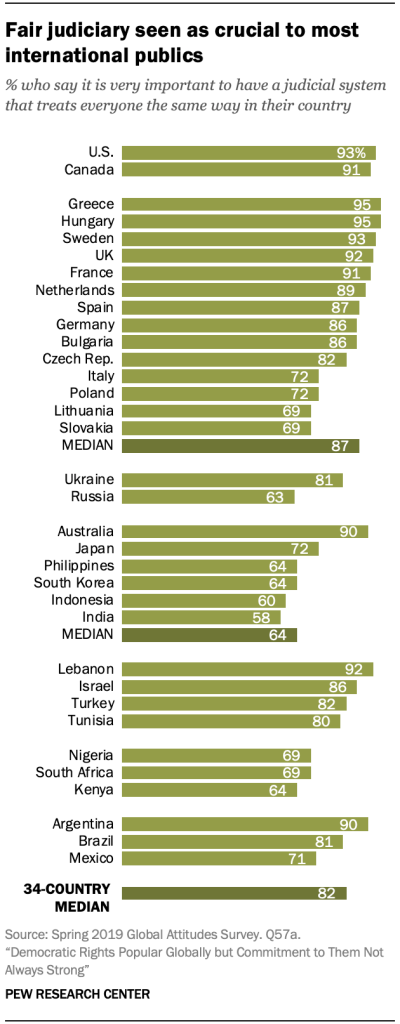
When it comes to institutional factors important to democracy, having a judicial system that treats everyone fairly was the value most likely to garner support across the countries surveyed. Across the 34 countries, a median of 82% say a fair judiciary is very important. Support is highest in Greece and Hungary (95%) and lowest in India (58%).
A fair judiciary is seen as particularly important among Europeans, though more so in the West than in the East. Large majorities in Middle Eastern and North African and Latin American countries surveyed also say that they think a fair judiciary is very important, while support is somewhat weaker in sub-Saharan Africa and the Asia-Pacific.
Regular and competitive elections
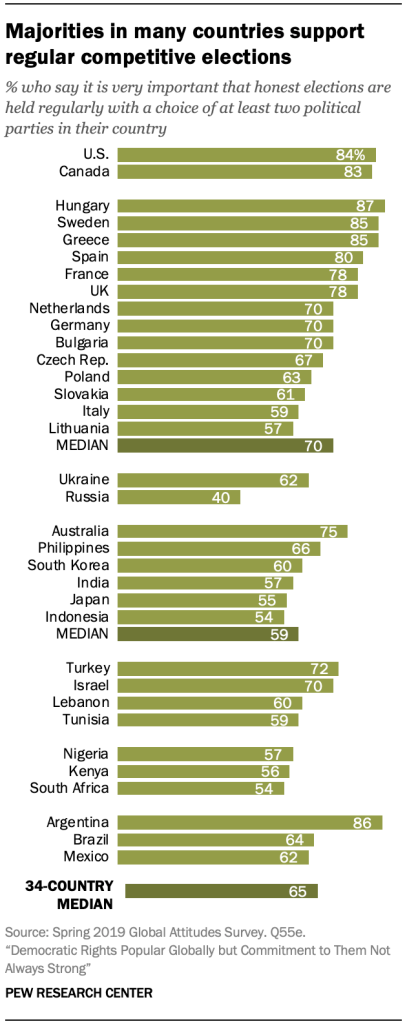
Global publics are somewhat less enthusiastic in their support for regular elections with more than one party. Still, a median of 65% across the nations polled consider competitive elections very important. Only in Russia do fewer than half say it is very important for their country.
Among the 25 countries where the question was previously asked in 2015 or 2016, support for regular elections rose significantly in eight countries and declined in five. More cite them as very important in Turkey (+22 percentage points), Israel (+14), France (+12), Indonesia (+11), the Philippines (+11), Hungary (+8), India (+8) and Argentina (+6). Support is down in Germany (-6), Ukraine (-7) and Brazil (-7). Sizable declines in support for regular and competitive elections are evident in Italy (-14 percentage points) and in Russia (-17), where the survey was conducted prior to President Vladimir Putin’s announcement to change the constitution.
Attitudes toward free expression
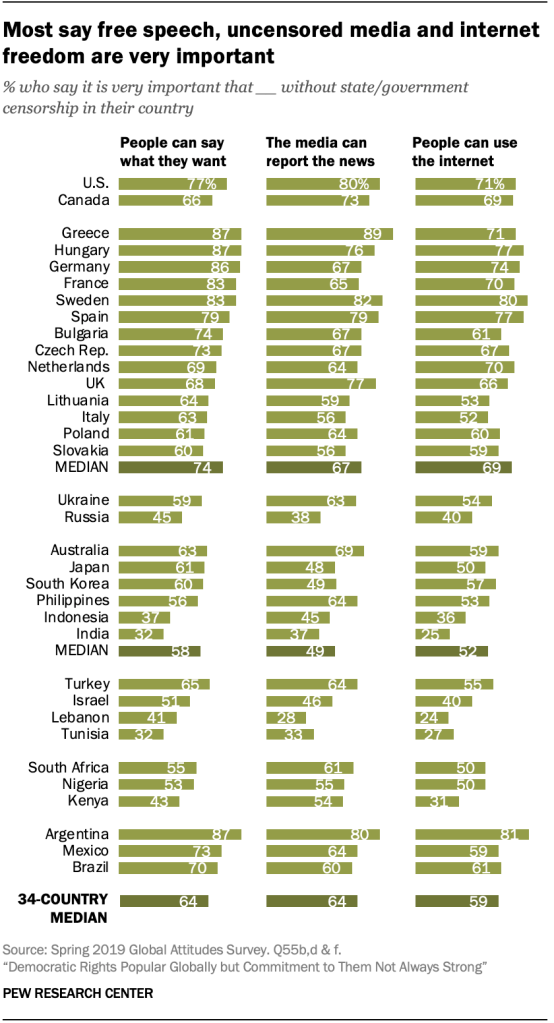
The right to say things without government censorship is held in high regard among Western Europeans, Canadians and Americans, of whom about seven-in-ten or more say that it is very important to have free speech, free press and freedom of expression on the internet in their country.
These values receive less widespread support in Central and Eastern European nations such as Poland and Slovakia.
Support is also generally less widespread across the Middle East and North Africa, sub-Saharan Africa and Asia-Pacific. Within these regions, people in Turkey, South Africa and Australia stand out as the strongest supporters of these values compared with their neighbors. In Latin America, eight-in-ten Argentines or more say all three principles are very important, while about six-in-ten or more in Mexico and Brazil say the same.
A median of 64% across the nations surveyed rate freedom of speech as very important, although, there is variation across countries; only 32% say this in India and Tunisia compared with 87% in Greece, Hungary and Argentina.
Support for freedom of the press also varies around the world. While more than half in most countries say that a free press is very important, support is weaker in countries like Lebanon (28%) and Tunisia (33%) as well as most of the Asian-Pacific countries surveyed.
Freedom of speech on the internet ranks the lowest among the three items related to censorship. In most of the countries surveyed, large majorities say that they see internet freedom as at least somewhat important. Yet, when it comes to what is very important in their country, only in the Netherlands does internet freedom rank as the most important censorship issue for the public.
Internet users are much more likely than non-users to say it is very important that people can use the internet without censorship. For example, in the Czech Republic, only 31% of internet non-users say internet freedom is very important, compared with 75% of users.
In an era of increasing concern about misinformation, the share of people who say it is very important to have internet freedom, free speech and freedom of the press has risen in a number of countries around the world, most significantly in France (+16 percentage points or more on all three items), the UK (+11 or more), Indonesia and Argentina (both +8 or more).
In the countries for which trends and a measure of ideology are available, changes in the number of people who believe these measures of freedom of expression are very important often cuts across ideology. That is, all ideological groups are trending in the same direction in their views on free speech, free press and free internet. For example, in France, the percentage of people saying freedom of the press is very important grew from 46% in 2015 to 65% in 2019, including double-digit increases among all ideological groups: the left (+14 points), the center (+19) and the right (+24).
In the U.S., however, the increase occurred mostly among Democrats and Democratic-leaning independents, rising from 64% to 85%. Among Republicans and Republican-leaning independents, it remained largely unchanged (72% to 77%).
The increase on all three measures of support for free expression in Turkey has taken place disproportionately among those with a negative view of Prime Minister Recep Tayyip Erdoğan’s Justice and Development Party (AKP), though those who favor AKP saw modest increases in the share that view free speech and press as very important. The growth in support of free expression among Argentines has been driven by people in the political center.
Gender equality and religious freedom
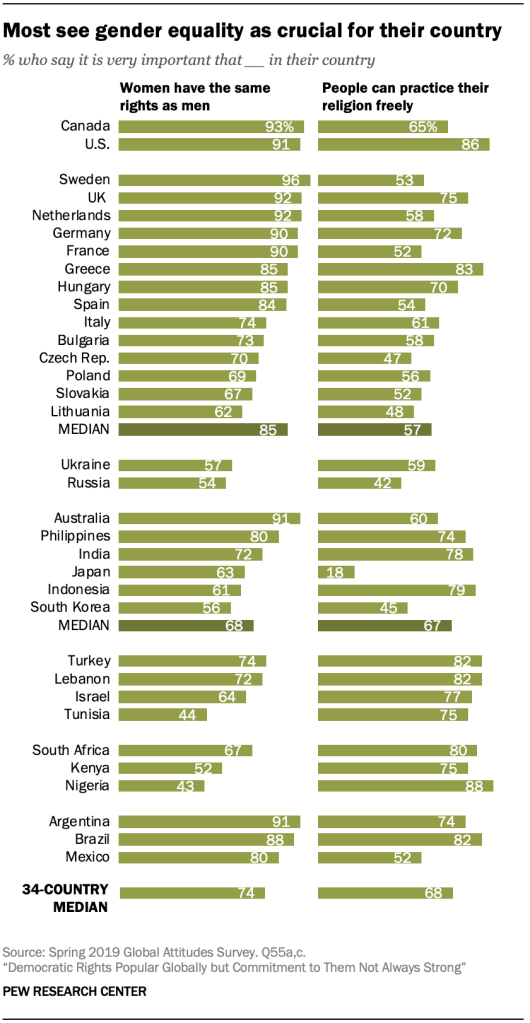
In every country surveyed, strong majorities say gender equality is very important with notable exceptions in Russia, Tunisia, Kenya and Nigeria.
Women having the same rights as men is one of the most widely supported values among both men and women across most of the countries surveyed. In some countries, mostly in Central and Eastern Europe, the Middle East and North Africa and sub-Saharan Africa, gender equality is seen as more important among women than men.
The percentage of people saying gender equality is very important declined from 2015 in only three nations, Nigeria (-11 percentage points), South Korea and Italy (both ‑8). Meanwhile, support rose in nine countries, most significantly in Turkey (+26), the Philippines (+21) and Indonesia (+17).
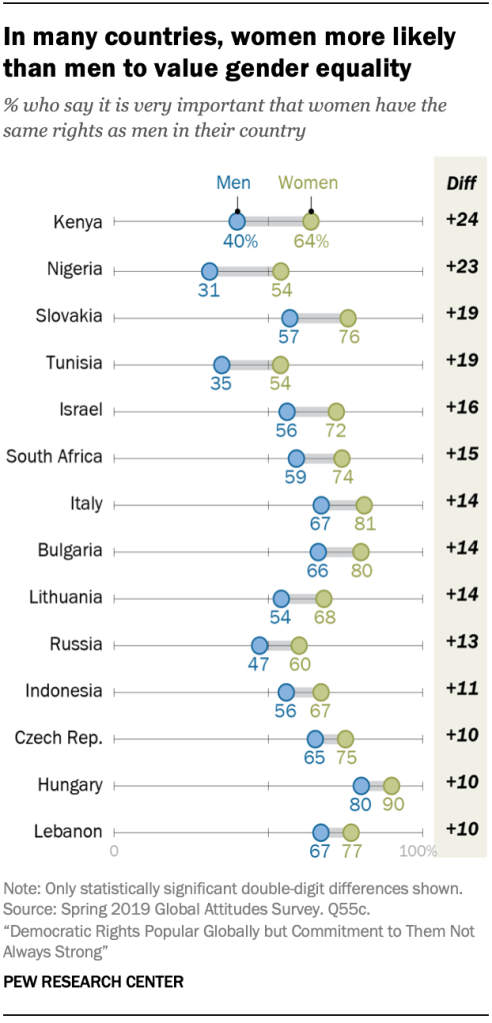
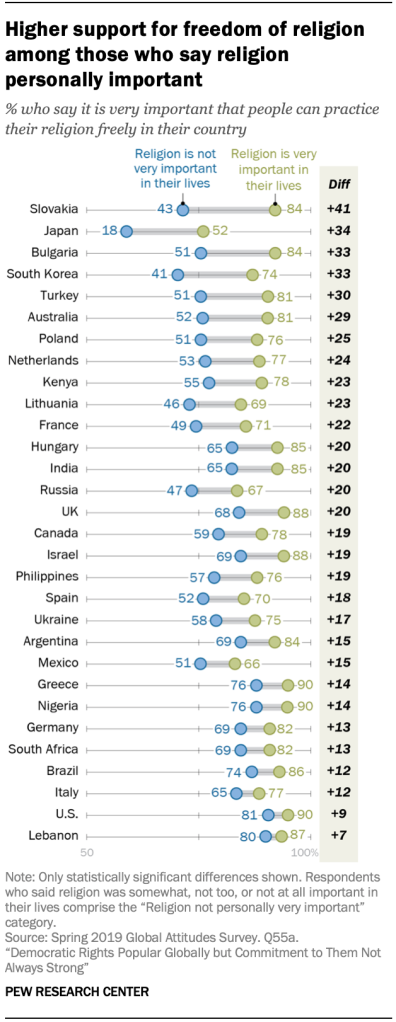
Across the nations polled, a median of 68% say it is very important for people to be able to practice their religion freely, with especially strong support in the Middle East and Africa as well as in the U.S., Greece, Indonesia and India. Support is lowest in Japan (18% very important) and Russia (42%).
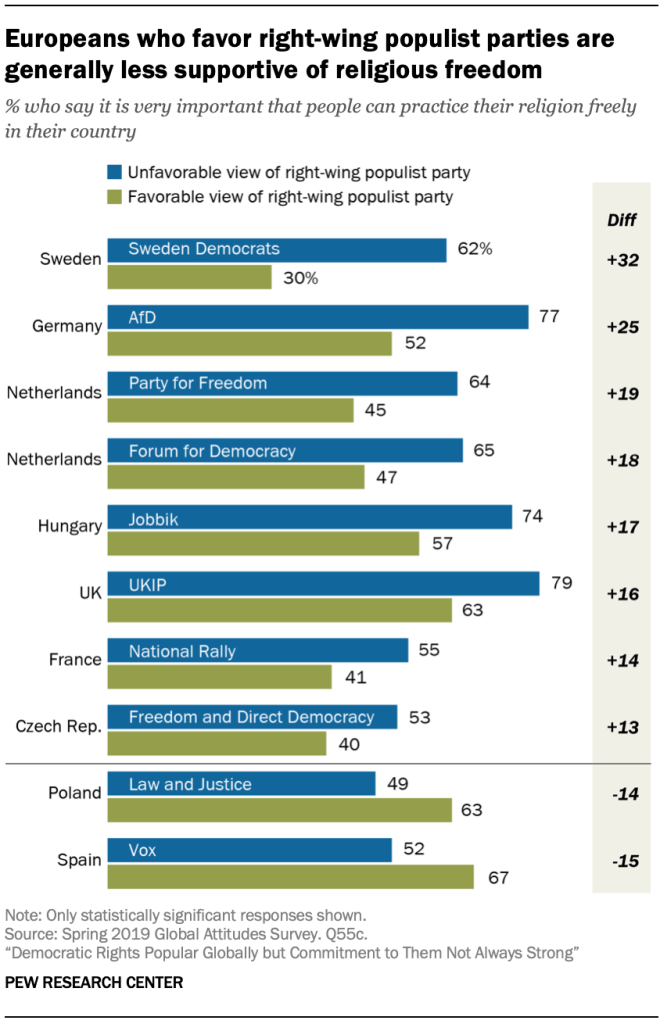
Public support for freedom of religion was largely stable from 2015/2016 to 2019, with increases in three nations and declines in four of 25 countries surveyed in both time periods. Increases in support were seen most notably among people in Turkey (+25) and the UK (+7), while larger declines were seen among publics in Mexico (-12), Italy (-14) and Russia (‑18).
In over half the countries surveyed, those who say religion is very important in their lives are more likely to believe religious freedom is very important.
In Europe, those who support right-wing populist parties are often less supportive of religious freedom than those who do not support these parties. For instance, 30% of those with a favorable view of the Sweden Democrats say religious freedom is very important, compared with 62% of Swedes expressing a negative opinion of the right-wing populist party.
Free operation of human rights organizations and opposition parties
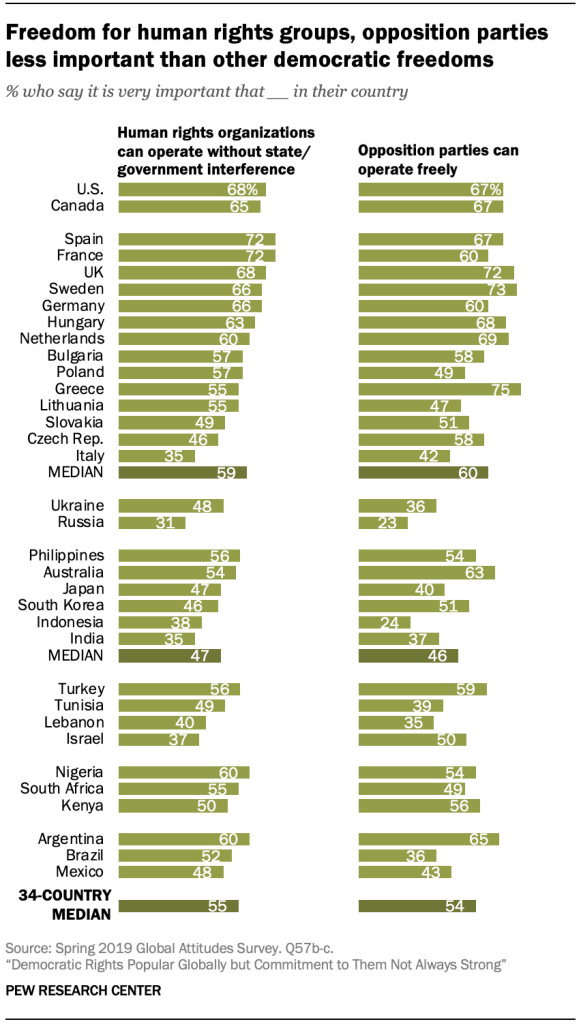
A median of 55% believe it is very important for human rights organizations to operate freely in their country. Civil society’s ability to act without state or government interference is most valued in France and Spain (both 72%) and is held in the lowest regard in Russia (31%). Fewer than half say that it is very important in about one-third of the countries surveyed, with support generally lowest in the Middle East and North Africa and parts of the Asian-Pacific region.
The free operation of opposition political parties garners the least support of the nine values asked about in the survey with a global median of 54% rating it as very important.
The importance of this value is generally highest in Western Europe and lowest in Russia, where one-party rule under Putin’s United Russia has been the norm over the past two decades, though opposition parties have made gains in recent years.




